- Home
- Kelley Armstrong
Made to Be Broken Page 21
Made to Be Broken Read online
Page 21
Neither was a grade-A disguise, but they'd do.
Chapter Thirty-four
At four thirty-five, we stepped through the very door we'd been watching that morning. It was a simple door, with a simple lock and dead bolt. A security system or camera was a definite possibility, but once inside, alone in a semidark stairwell, we had time for a thorough search. No alarm system. No camera. No need for them in a business like this.
To reach the office, we had to climb a set of old, narrow stairs that smelled of must and rotting wood, underlain with the faint "soaked into the walls" stink of urine. The stairs were slick with age and poorly lit. I didn't dare touch the handrail.
I wondered how many prospective parents never got past these stairs, struck by the uncomfortable feeling they were about to ascend into a squalid office manned by a sweaty beef-jerky-chomping guy named Sal, who had a sports book on the side. If a couple had any twinges of guilt over private adoption, any fear that it wasn't the legitimate business they'd been led to believe, they probably turned around right here.
But if they made it up the stairs, past the shadowy landing, and through the wooden door, all their fears would evaporate. It was like stepping into the reception area for an upscale preschool.
The reception desk was large, made of rich wood, with no hint of the corporate or industrial about it. The walls had been painted beige with just a hint of pink for warmth. Framed watercolors adorned the walls, all in soft, warm tones. Two armchairs waited, big and inviting, each flanked by a table with magazines, but with nothing between the chairs, letting the anxious or excited couple stay close, whispering or holding hands.
A glance at the magazines showed not a single parenting one. Nor were there any pictures of children - even the watercolors were all landscapes. No need to remind clients of what they lacked. And yet the general air still suggested a business that catered to children - maybe just that lived-in hominess that you couldn't help associating with family life.
The receptionist looked like a primary schoolteacher - early forties, with dangling, whimsical cat earrings, slacks, and a wool sweater decorated with bright geometric shapes. She even had that nursery school patois down, that cheerful singsong that's so reassuring to a child, but grates on anyone over the age of ten.
"Oh, you must be the Abbotts! I bet you're so excited. A little nervous, too, hmm? Don't be. Everyone here is so great. You're just going to love it."
I peered down the hall behind her, expecting to see a circle of preschoolers singing "If You're Happy and You Know It." As she led us into that hall, I was transported back thirty years, to my first day of school, that sudden terror that maybe I wasn't ready for this. Fortunately, I had someone to hold my hand and guide me forward, someone I trusted, someone who'd stay with me, and watch out for me. Or I did today - Jack's hand engulfing mine, his firm grip reassuring me we could pull this off. Thirty years ago, I hadn't been so lucky. Mom had pulled up to the curb and pointed me toward the door, annoyed that Dad had been called into the station when he'd planned to take me to my first day of school. I'd made her late for her weekly bridge game.
Inside the office, we were introduced to our "case coordinator." Conrad Soukis was one of the two employees who could pass for Fenniger's contact. The description, sadly, fit an entire legion of men best categorized as "middle-aged pencil-pushers." Soukis was roughly Jack's age, but with none of his edge, none of his physical power, none of his - I hate to say it - virility. Average height, receding hairline, scrawny but with a paunch, and the bland, pasty face of someone who spent his days basking in the glow of a computer screen.
Soukis sat us down and started with a description of the agency's services. He sped through them, probably recognizing the look that said he wasn't telling us anything we didn't already know. Then it was time to find out more about us, our expectations and our situation.
We wanted children - that much was obvious. We'd been trying since our marriage. At first, I'd blamed the difficulties on passing thirty, moving farther from my prime childbearing years. But last year, a barrage of fertility tests revealed the real problem: my husband's low sperm count.
When Jack and I devised the plan, I'd been perfectly willing to take the medical blame for the Abbotts' inability to reproduce, but as Jack pointed out, "low sperm count" was a simple concept that didn't require an in-depth explanation, and he knew a way he could use it to our advantage.
So we played our stereotypical roles. The teacher wife did all the explaining, being very careful to couch the fertility issue as "our" problem while her silent, rough-mannered husband struggled not to squirm, clearly uncomfortable with the subject and with the disappointment of being to blame for not giving his younger wife the baby she longed for.
I talked about my situation - how I'd always imagined I'd have children, and became a teacher out of love for little ones, but as my twenties slipped past, I'd come to accept that the "minivan and 2.5 kids" lifestyle wasn't in my future.
"Then I met Wayne," I said, beaming at Jack. "At first, I figured if we did get serious, kids would be out of the question. If he'd wanted them, he'd have had them with his first wife. But I wanted him, not a baby-maker. I wouldn't have even raised the issue, but then - " Another broad, loving smile. " - he did, and he wanted a child, so it was perfect."
Jack nodded. "My first wife, she didn't want kids, which was okay. I was busy with my business and, besides, it wasn't - " He cleared his throat. " - it wasn't a good marriage. I didn't want to bring kids into it. This time - " Another throat clearing, obvious embarrassment at discussing his marriage with a stranger. "It's different."
Soukis moved on to our requirements. As for gender, we had no preference. Same with age, so long as the child was under a year. But race? That was another story.
"It doesn't matter to me at all," I said. "A baby is a baby." I snuck an anxious look at Jack, who nodded a "same here," but without conviction. "But where we live... that's the problem. Wayne's business is there, so we won't be leaving anytime soon, and the town is very... racially homogeneous."
"White," Jack said.
"As someone who works with children, I know firsthand that it doesn't matter how accepting the parents are. If the surrounding society isn't as accepting, it can be very difficult for the child. So we'd need to have a, uh - " I dropped my gaze as if in shame. "Caucasian baby. Other wise, we'd have pursued international adoption."
"That will make it harder," Soukis said.
My gaze dropped another fraction as I added a mournful "I know."
Jack reached over to squeeze my hand.
Soukis asked a few more questions, then explained the next steps. If no complications arose in the background check and home study, we'd be put on the waiting list, but with our "requirement," it would probably be a three-year wait, maybe longer.
I let my disappointment seep out while Jack squeezed my hand and whispered words of support and reassurance. Then he asked me to give him a moment alone with Soukis, just to run over some of the financial details again. He stayed behind in the office, and shut the door all but a crack, so I'd hear their voices.
As I left, I realized our late-day appointment came with a huge bonus. The agency's workday must have ended at five and, being a Monday, no one was keen to stay late, so by 5:15 the office was empty.
I started in the reception area. My gaze kept sliding to the dual temptations of the filing cabinet and computer, but I needed more time with them. I concentrated on figuring out how Jack and I could safely break in.
I zoomed through the front room, having already gotten a decent overview when we'd been admitted. No alarm system. No camera. Just a regular lock and dead bolt, like the street-level door.
I quickly moved on to the office. I could hear Jack and Soukis, their voices muffled and low, but still audible.
"Deb doesn't know about any of that," Jack was saying. "I'm not hiding it from her. There's just no reason to bring it up now, right? Ancient history. The credit stuff,
well, it comes with the territory, starting a business. The assault was a bar fight that got out of hand when I was a stupid kid. And the DUI ten years ago... I wasn't a kid, but still stupid, you know? The divorce and the stress at work... It's all in the past and none of it has anything to do with Deb, but I'm worried it's going to hurt our chances of adopting a kid."
"It could."
"Shit."
"In fact, I hate to say it, but it almost certainly will."
Their voices faded as I moved into the farthest office. There were four offices in total - five employees, including the receptionist. None of the doors had locks. The filing cabinets did, but they'd be easily picked, the sort that only stopped someone casually trying to peek inside.
The computers would be the biggest stumbling block. I could download e-mail and data files onto a flash drive, but that was the extent of my knowledge... and I was pretty pleased with myself for knowing that much. If the operating system was password protected, I was screwed. I'd have to check with Evelyn and see whether she knew a way to bypass it to grab files. Another charge for my tab.
The voices surged louder as I moved to the office across the hall.
"I get their reasoning," Jack was saying, "but I'm not the same guy now. Deb's the best damned thing that ever happened to me. She'd make a great mom, and if she can't have a kid because of me, first because of this... sperm thing, and now because of shit I did before I met her..." His voice trailed off.
"I understand."
"Do you?" Despair tinged Jack's voice. "I love that woman. The only thing I want is for her to be happy. I'll do whatever it takes to see that happen. Do you get that?"
"I'm not sure..."
"Hell, I don't know what I'm asking. Just, you know, some way to grease the wheels."
"If you mean anything illegal..."
"Not that. I wouldn't - " A short, embarrassed laugh. "Yeah, I would. Hell, there's not much I wouldn't do to make her happy, you know? But this is a completely legit business and I get that. I just thought, you know, sometimes there are ways... around stuff."
Their voices fell again as I hurried back to the main room, knowing Jack's talk was coming to a close. He'd planted the seeds. If they bore fruit, it wouldn't be tonight.
Five minutes later, we were back on the street.
"Any nibbles?" I asked.
"Hard to say. Seemed sympathetic."
"How could he not be? I knew what you were doing and I still felt bad for you. A perfect play. The right pitch. The right tone. Just an ordinary guy who loves his wife and wants her to be happy. If Soukis is involved, I bet you'll be getting a call."
"Doesn't matter. Just a side play. Main point - "
" - was getting an inside view of the setup and security. The biggest obstacle will be getting through that street-level door, where anyone can see us breaking in. The only windows are up front, and the fire escape is there, which is just as risky - if not more so - than coming through the front door. But we'll come up with something, and after that door is open, it'll be a cakewalk. I'll give you the details over dinner."
I swung around the corner, my fingers grazing the streetlamp. "I was thinking steak before our stakeout, if that's still something you like."
"Always"
"Good. I saw a place a few blocks over. We should probably drive, with your foot - "
"I'm fine. Warm enough. We'll walk."
I nattered on about Jack's great performance for the first block before stopping myself. "Sorry. I really don't need any more sugar today, do I?"
"Things are going well. You're happy. Nothing wrong with that."
"Thanks. Oh, and for a more tangible thank-you, I picked up something at the mall."
From my purse, I pulled a pack of his special brand of cigarettes. His eyes lit up, probably the same way mine had when he'd handed me candy this morning.
He reached for it.
"Not so fast," I said. "It comes with a price. You'll get them after the stakeout, and I'll get a story. You still haven't told me how you hurt your foot."
He nodded, gaze swinging to look down the road. My cheeks heated and I thrust the package at him. "I'm kidding. Like I said, it's a thank-you for - "
He didn't take it. "I'll tell you. Said I would."
"You don't have to if it's - "
"Tonight. After the stakeout. Cigarette and a story. Gotta warn you, though. Not very interesting. Just damned stupid. And embarrassing."
"Those are the best kind. If even you can screw up now and then, there's still hope for me."
Chapter Thirty-five
We had a great dinner. Jack once told me that growing up he'd dreamed of being rich enough someday to have steak every night. He'd tried it, following his first job, and gave up after a few weeks, but a steak house is still his restaurant of choice.
So finding one was a way to put him into a good mood, relaxed, even voluble... or what passed for voluble with Jack. After a quick rundown of the security - couched in terms appropriate for a public setting - conversation turned to the more personal... or what passed for personal with Jack. He told me a story about an old job - also modified for the setting and containing no information to identify the target, location, or even time period, but entertaining nonetheless.
We had dessert at a patisserie three doors from the coffee shop where we'd staked out the Byrony Agency. We went in at 10:30 p.m., which seemed late for dessert, but I'd noticed earlier that the place was open until midnight, presumably to catch the postshow crowd from the theater down the road. Before the show got out, the place was nearly empty, and we easily got a window seat.
I ordered a chocolate torte. Jack got apple pie. I teased him about that - faced with a display of elaborate desserts, he picked something he could have any night at the lodge. When it arrived, he seemed a little annoyed by the attempts to fancy it up with caramel crackles, whipped cream, and chocolate drizzles. After a few bites, he pronounced it decent enough, but not as good as Emma's... and he left the broken crackles and blob of cream on the side.
As the shop started to fill with the theater crowd, two women entered the Byrony Agency. Cleaning staff. By 11:45, as we were settling the bill, they were already leaving, being either superefficient or figuring, with the empty office, no one would know how long they'd stayed.
We took our time. The staff, unlike the cleaners, seemed in no rush to get home, and when we left at 12:10, they'd done no more than dim the lights as a subtle hint to the remaining diners.
As I stepped onto the sidewalk, my gaze scanned the opposite side of the street. Dark and quiet.
"Fuck."
I followed Jack's glare to a homeless guy on the coffee shop steps.
"He's just catching the stragglers from the show," I murmured. "When the shop clears and closes, he'll leave. We can't move until then anyway."
We tucked ourselves into an alley. Twenty minutes later, the last of the dessert shop staff locked the door, the click echoing. Through the reflection in a store window, I watched the homeless man stand, stretch... then retreat farther into the alcove and curl up in its shadows.
"Fuck," I said.
Jack grunted his agreement.
We waited, hoping he was just resting or that a passing cop would roust him. But the man stayed in his corner, the sidewalk stayed empty, and the street saw a car only every few minutes.
"If he's asleep, maybe we can..." I shook my head. We couldn't risk it.
We waited until a distant church bell rang twice, and my nose and toes had gone numb. Then Jack shook his head and motioned me toward the car. We weren't getting into the Byrony Agency tonight.
"Three hours to Evelyn's," Jack said as we climbed in. "This time of night? Probably less."
"You don't need to come up with distractions for me, Jack. Yes, I'm disappointed, but we knew this wouldn't be an easy break-in. We'll try again tomorrow night, with backup plans for dealing with the guy, if that's his regular spot. If we're lucky, we'll have Quinn. I'm sure he can p
lay cop and send him on his way."
"Wasn't a distraction. Just saving time. Getting it over with. Unless you're tired..."
"Even if I was, I don't think I'd sleep."
"Good." He opened the door and got out. "Take first shift. Head to 94 west."
There was no rush so we stopped for washroom breaks, leg stretches, and coffee runs, taking turns at the wheel. I'll admit I'd hoped one of those stops would be a cigarette break, so I could hear Jack's story. I wasn't as interested in knowing how he'd broken his foot as in the simple fact of his telling me, trusting me enough to share a story that was, as he said, embarrassing. But he didn't suggest it, and I started to feel a little silly about our deal, maybe even rude, asking for a personal story before I gave him the cigarettes. So at the last driver switch, thirty minutes from Fort Wayne, I opened the hatch and slid the pack from my bag to his.
We arrived at Evelyn's just before six. Jack parked at the usual strip mall around the corner. If it seemed like we'd stay longer than a couple of hours, he'd move the car to her garage.
As we climbed her steps, I asked what time she expected us.
"Doesn't."
"She doesn't know we're coming? We're showing up, unannounced, on her doorstep at six in the morning? That's not very nice."
"Yeah."
I laughed. He knocked, then waited ten seconds and knocked again.
After another minute came the faint sound of footsteps on the stairs. Now she needed to check who it was. There wasn't a peephole. In this neighborhood, populated with upper-middle-class retirees, I'm sure there were lots of peepholes. But Evelyn would never get one installed for fear she'd be mistaken for something a lot worse than a cautious retired criminal: a nervous little old lady. And, besides, peepholes? This was the twenty-first century. For Evelyn, nothing short of a wireless, motion-detecting, autotracking closed-circuit camera would do.

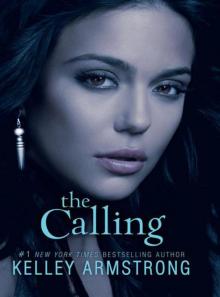 The Calling
The Calling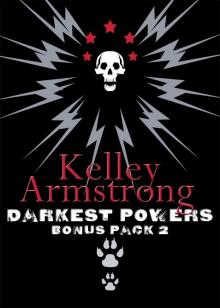 Darkest Powers Bonus Pack
Darkest Powers Bonus Pack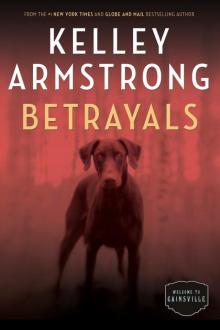 Betrayals
Betrayals Sea of Shadows
Sea of Shadows Rough Justice
Rough Justice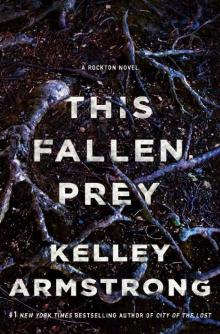 This Fallen Prey
This Fallen Prey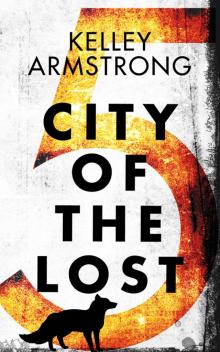 City of the Lost: Part Five
City of the Lost: Part Five Perfect Victim
Perfect Victim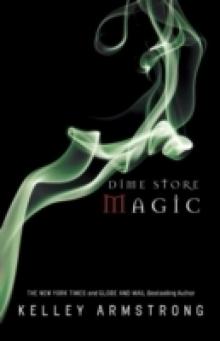 Dime Store Magic
Dime Store Magic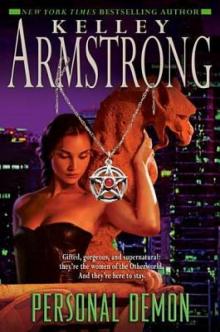 Personal Demon
Personal Demon Haunted
Haunted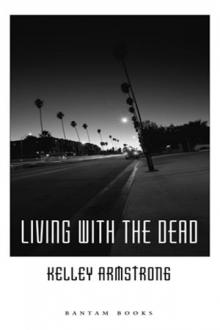 Living With the Dead
Living With the Dead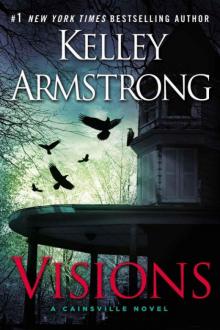 Visions
Visions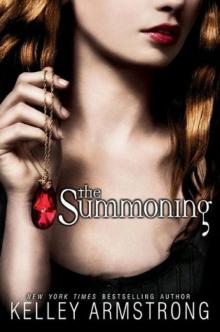 The Summoning
The Summoning Broken
Broken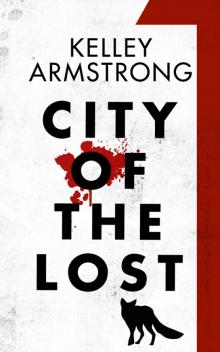 City of the Lost: Part One
City of the Lost: Part One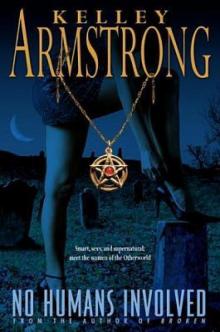 No Humans Involved
No Humans Involved The Awakening
The Awakening The Reckoning
The Reckoning The Gathering
The Gathering Bitten
Bitten Thirteen
Thirteen Gifted
Gifted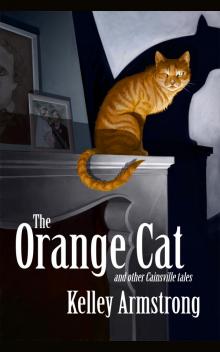 The Orange Cat and Other Cainsville Tales
The Orange Cat and Other Cainsville Tales Darkest Powers Bonus Pack 2
Darkest Powers Bonus Pack 2 Rituals
Rituals Waking the Witch
Waking the Witch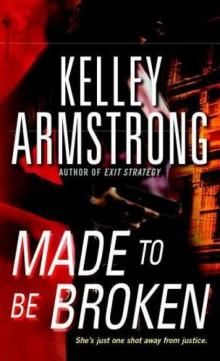 Made to Be Broken
Made to Be Broken Lost Souls
Lost Souls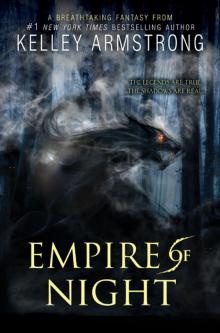 Empire of Night
Empire of Night Wild Justice
Wild Justice Double Play
Double Play Alone in the Wild
Alone in the Wild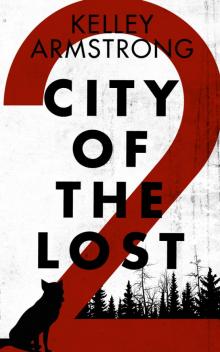 City of the Lost: Part Two
City of the Lost: Part Two A Stranger in Town
A Stranger in Town Watcher in the Woods: A Rockton Novel
Watcher in the Woods: A Rockton Novel Atoning
Atoning Spellbound
Spellbound Wolf's Bane
Wolf's Bane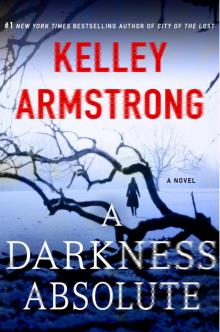 A Darkness Absolute
A Darkness Absolute Ballgowns & Butterflies: A Stitch in Time Holiday Novella
Ballgowns & Butterflies: A Stitch in Time Holiday Novella Wherever She Goes
Wherever She Goes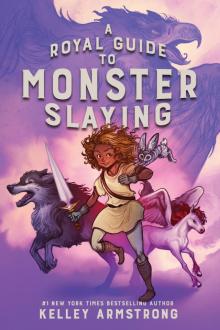 A Royal Guide to Monster Slaying
A Royal Guide to Monster Slaying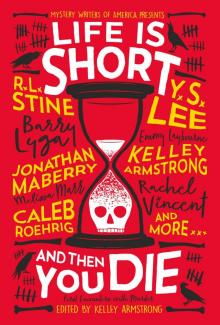 Life Is Short and Then You Die
Life Is Short and Then You Die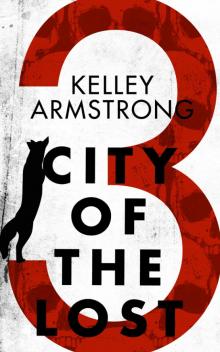 City of the Lost: Part Three
City of the Lost: Part Three Frostbitten
Frostbitten A Stitch in Time
A Stitch in Time Industrial Magic
Industrial Magic Wherever She Goes (ARC)
Wherever She Goes (ARC) Snowstorms & Sleigh Bells: A Stitch in Time holiday novella
Snowstorms & Sleigh Bells: A Stitch in Time holiday novella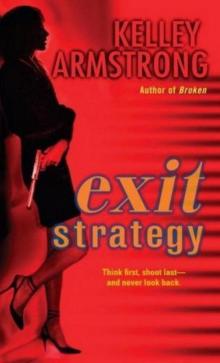 Exit Strategy
Exit Strategy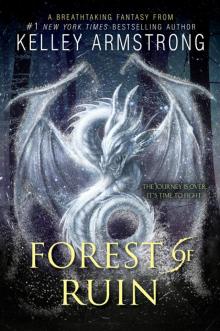 Forest of Ruin
Forest of Ruin Cursed Luck, Book 1
Cursed Luck, Book 1 The Gryphon's Lair
The Gryphon's Lair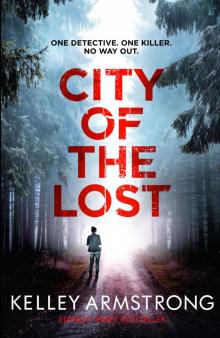 City of the Lost
City of the Lost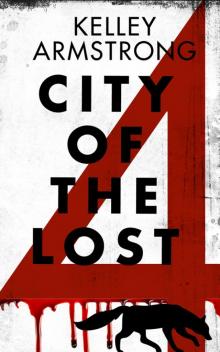 City of the Lost: Part Four
City of the Lost: Part Four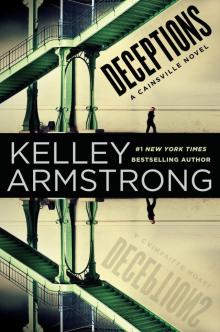 Deceptions
Deceptions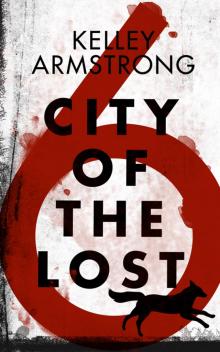 City of the Lost: Part Six
City of the Lost: Part Six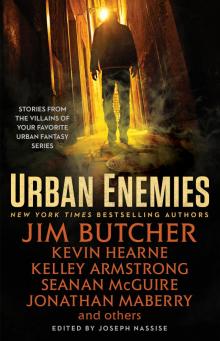 Urban Enemies
Urban Enemies Stolen
Stolen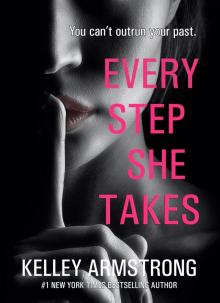 Every Step She Takes
Every Step She Takes Portents
Portents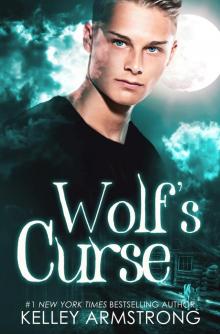 Wolf's Curse
Wolf's Curse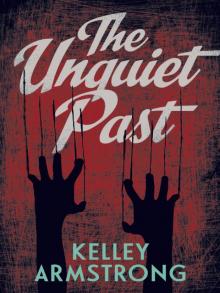 The Unquiet past
The Unquiet past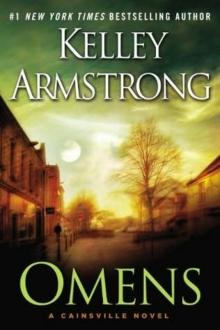 Omens ct-1
Omens ct-1 Cruel Fate
Cruel Fate The Calling dr-2
The Calling dr-2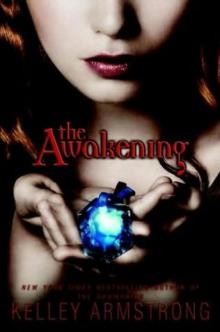 The Awakening dp-2
The Awakening dp-2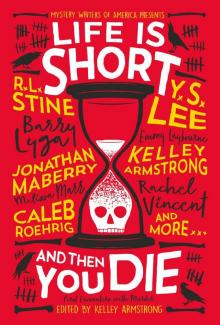 Life Is Short and Then You Die_First Encounters With Murder From Mystery Writers of America
Life Is Short and Then You Die_First Encounters With Murder From Mystery Writers of America Goddess of Summer Love: a Cursed Luck novella
Goddess of Summer Love: a Cursed Luck novella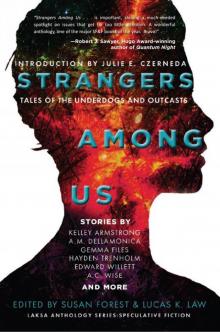 Strangers Among Us
Strangers Among Us The Gathering dr-1
The Gathering dr-1 The Rising dr-3
The Rising dr-3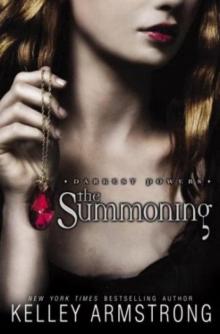 The Summoning dp-1
The Summoning dp-1 The Hunter And The Hunted
The Hunter And The Hunted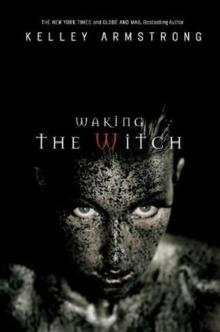 Waking the Witch woto-11
Waking the Witch woto-11